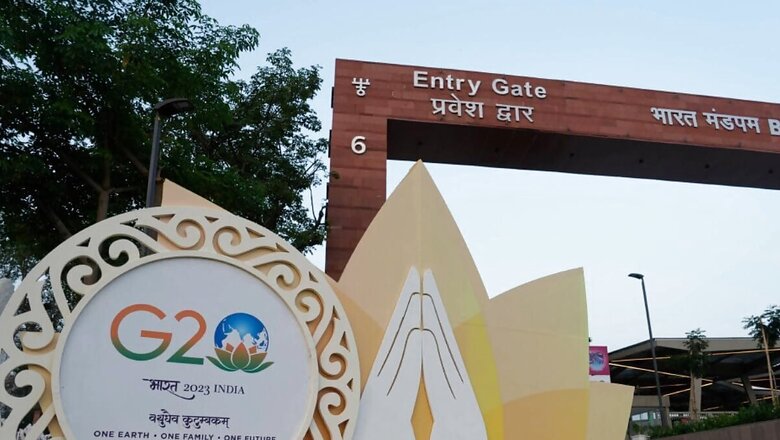
views
Although the realm of international diplomacy and economic cooperation might occasionally appear complicated, everyone must have some interest in it since it plays a fundamental role in shaping the society we live in today. The G20 summit, which brings together the world’s largest economies to address global concerns, is an important forum for this kind of cooperation. This year’s G20 presidency is being held by India, which presents an exceptional chance for the nation to drive these debates and have an impact on beneficial developments on a global level.
In today’s Classes With News18 let’s delve into what the G20 is, how a country becomes its president, and what India’s role means for various industries.
Understanding the G20 Summit
The G20, a group consisting of twenty of the largest economies in the world, was established in 1999 and meets annually to coordinate global policy on trade and commerce, health, the environment, and other issues that impact not just one nation but the entire world.
The G20 leaders’ annual summit, which began in 2008, is a significant event when leaders from 19 of the world’s largest economies, together with the European Union, come together to address crucial issues around the world. Developed nations like the United States, Japan, and Germany are represented in this group, along with growing economies like India, China, and Brazil.
Leaders discuss a range of subjects during the G20 conference, including trade, the environment, healthcare, and other matters. They deliberate about how to deal with issues like poverty and climate change as well as how to ensure that the world’s economy remains strong and expanding. The G20 summit’s conclusions might significantly affect people’s lives all across the world. More than 80 per cent of the world’s GDP, 75 per cent of its commerce, and 60 per cent of its people are represented by G20 countries.
G20 Member Nations
The G20’s 20 members are organised into five groups, with the exception of the European Union, which is not a part of any nation group:
GROUP 1: Australia, Canada, Saudi Arabia, and the United States
GROUP 2: India, Russia, South Africa, and Turkey
GROUP 3: France, Germany, Italy, and the United Kingdom
GROUP 4: China, Indonesia, Japan, and South Korea
GROUP 5: Argentina, Brazil, and Mexico
Selection Process for G20 Presidency
We must look at the G20 presidency as a form of rotating responsibility among its member countries. A different nation is given the opportunity to establish the agenda and steer the conversation at the G20 summits every year. But how is a nation picked for this position?
After discussions, each year, one of the five country groups gets to take turns picking the G20 president. The nations within the relevant group must come to a consensus among themselves to choose the next G20 President as all countries in the group are eligible to assume the G20 Presidency when it is their group’s time.
The selection process is determined by a few essential components, which include:
1. Economic Stability: A nation’s economy must be stable for it to serve as the G20 president. This implies that it ought to be creating a lot of products and services, engaging in trade with other nations, and making a positive impact on the world economy.
2. Diplomatic Prowess: At G20 summits, world leaders representing many ideologies are present. Therefore, the nation of choice must be able to convene other nations for productive dialogue and maintain strong diplomatic ties. The G20 president should be a nation that can influence global discussions and make positive changes.
3. Potential for Change: The candidate for the G20 presidency should be able to influence progress both domestically and internationally. It should be able to motivate other nations to cooperate for the greater good of all nations to bring in changes.
India’s G20 Presidency and Potential Impact
India’s G20 leadership provides a chance to highlight the country’s assets and long-term goals. During its presidency, India will be able to draw focus onto problems that are important to its people and the rest of the world as a whole. India, for instance, can take the lead in conversations about technology and innovation by showcasing its prowess in the IT sector and promoting ethical digital practices.
Additionally, India’s dedication to sustainability and renewable energy can have an impact on international discussions on climate change and environmental protection. India can encourage other nations to adopt more environmentally friendly practices by exchanging its experiences and strategies.
In essence, India’s G20 presidency is proof of its increasing significance on the world forum. By taking the reins and guiding conversations, India can help develop solutions to present-day challenges and sculpt a brighter future for everyone.
To learn about other topics taught in school, explained by News18, here is a list of other Classes With News18: Queries Related to Chapters on Elections | Sex Versus Gender | Cryptocurrencies | Economy & Banks | How to Become President of India | Post Independence Struggle | How India Adopted Its Flag | Formation of States & United India | Tipu Sultan | Indian Teachers Day Different from Rest of the World |Queen Elizabeth & Colonialism | Article 370 |



















Comments
0 comment